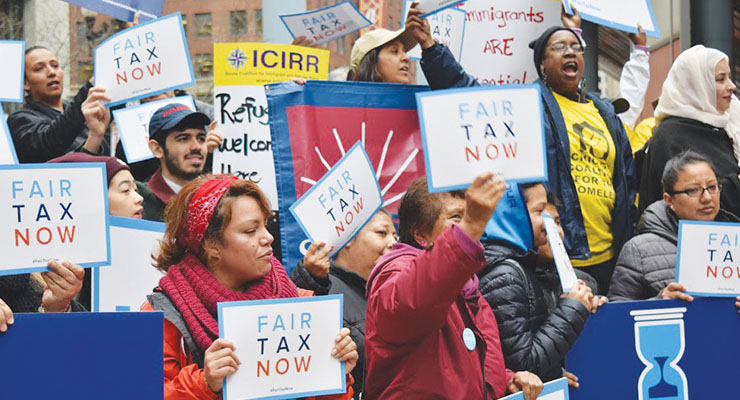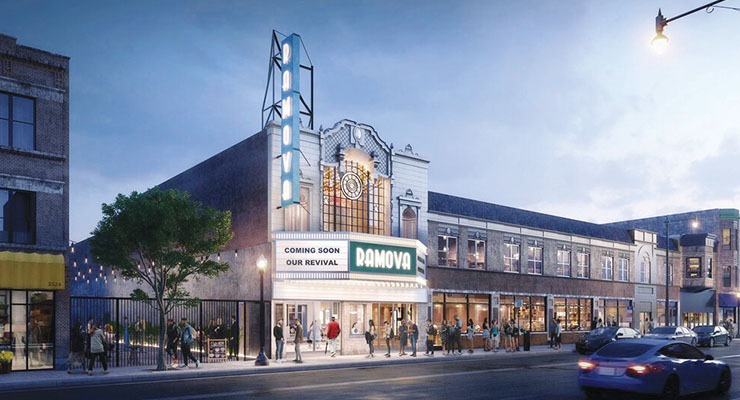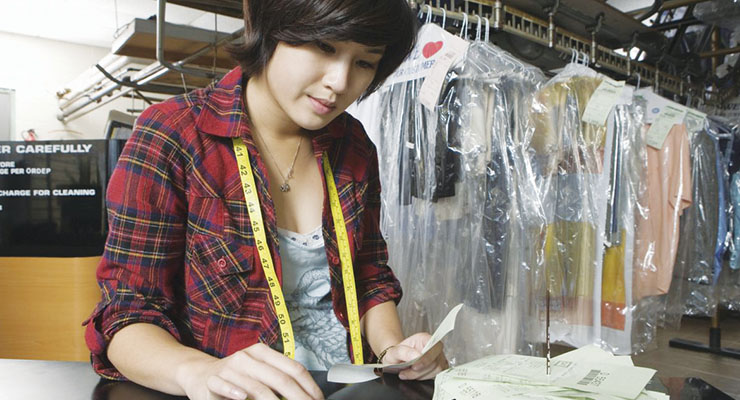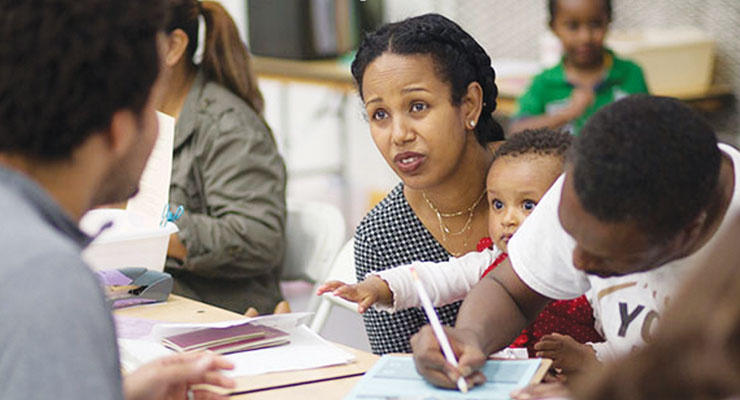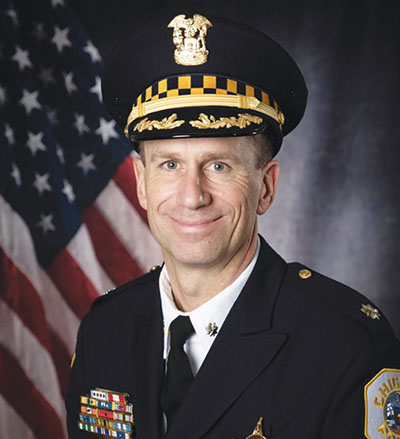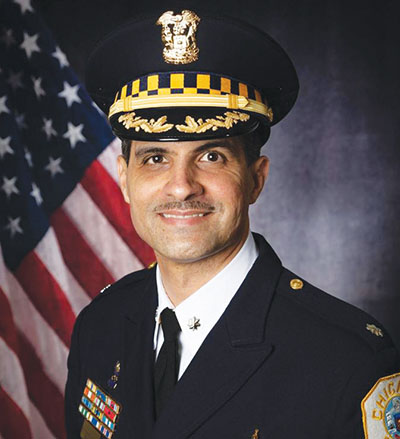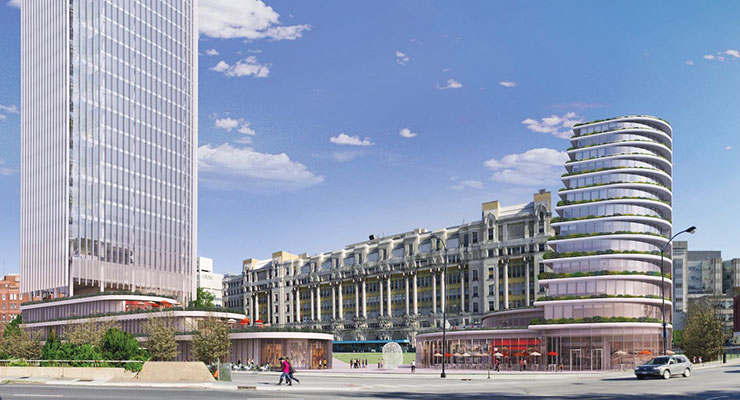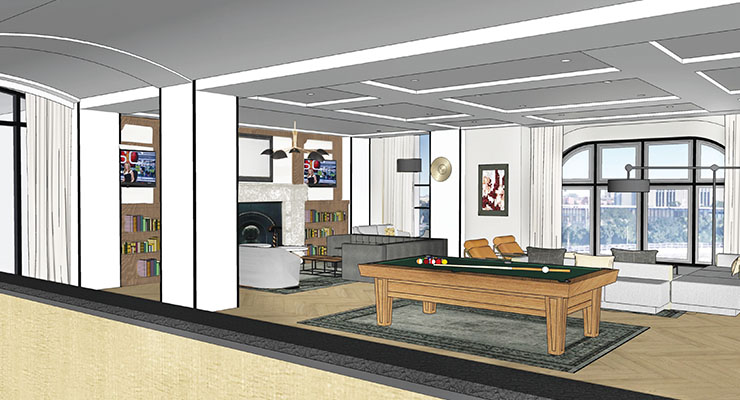By Peter L. Winslow
Developers for One Central, a multibillion-dollar real estate venture proposed for the South Loop, still have their hearts set on a 34-acre site adjacent to McCormick Place, and they have received an extension for a Railroad Rehabilitation and Improvement Financing (RRIF) loan application.
Their proposal details a massive mixed-used complex comprising housing, highrise office space, entertainment venues, and a transit center to repurpose the 18th Street Metra railyard. Landmark Development has owned the air rights above the Metra tracks since 1989.
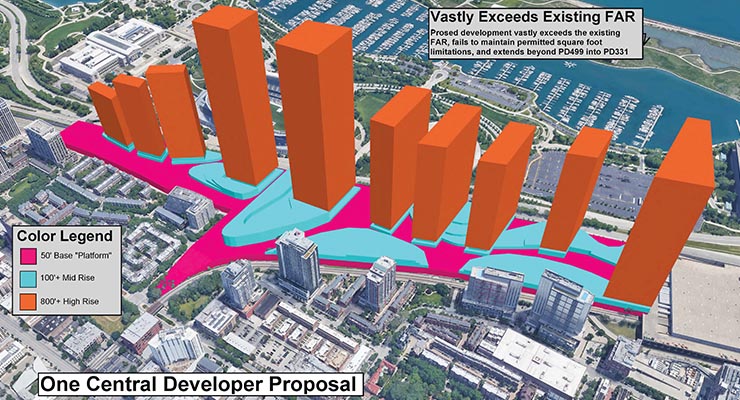
One Central’s FAR (floor area ratio) vastly exceeds City standards, according to
the members of the South Loop Concerned Coalition (SLCC).
Without presenting a bill to the Illinois General Assembly, lawmakers last spring authorized a backdoor route to promise public funding to the private venture. This public subsidy hinges on Landmark’s ability to secure a federal loan from the Department of Transportation’s RRIF program as well as approval by Mayor Lori Lightfoot and the Chicago City Council. Planners estimate project construction will take 15 years and cost nearly $20 billion.
The original RRIF program deadline arrived Dec. 31 of last year, but the Federal government granted a nine-month extension, giving applicants until Sept. 30 to submit applications. This extension gives Landmark wiggle room to work with the City, address concerns, and factor in possible coronavirus (COVID-19) implications. A spokesperson for Landmark stated, however, the firm has no further advancements to share at this time.
If the developers obtain these Federal funds, they can use them to construct what Landmark terms the “civic build,” which would contain the transportation facilities and project portions expected to yield sales taxes, such as restaurants, entertainment, shops, and other amenities; workers would build these features on a platform covering the railyard. Developers also may use Federal railroad loans to fund real estate development, not exclusively transportation infrastructure.
In turn, the State will use sales tax revenue from the amenities to buy the transit hub from Landmark, which will own and manage the “private build”— the residential and commercial office space.
The transit center forms an integral feature in this proposal’s complex financing, but developers have had only preliminary discussions with transit providers such as the Chicago Transit Authority (CTA), Metra, and Amtrak. They have not given the City of Chicago any updates since the initial proposal presented in 2019.
At the time State Representative Kambium Buckner (D-26th) noted neither Metra, the Regional Transportation Authority, nor the CTA has expressed a need for the transit hub. Ald. Pat Dowell (3rd Ward) voiced concern about new transit’s “sound and physical impacts to affected residents,” whom she did not want “impacted by another train line in the area.”
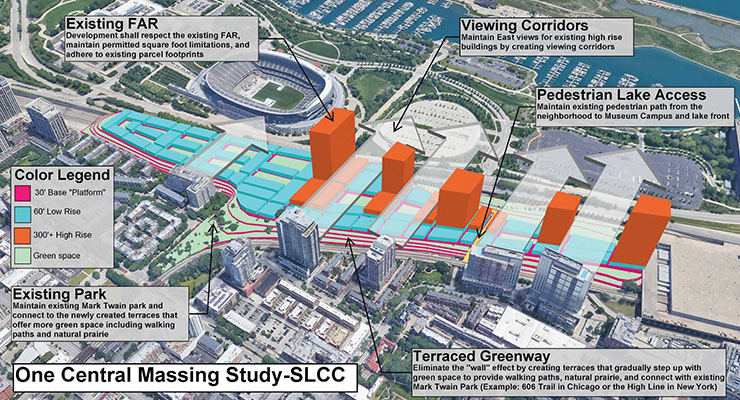
Lightfoot, Dowell concerned
Lightfoot and Dowell have raised concerns as well as their desire for robust community engagement and for the City to institute a thorough vetting process.
The South Loop Concerned Coalition (SLCC), a non-profit organization comprising of 18 homeowner associations and thousands of area residents, continues to monitor One Central’s development and advocate for a more transparent evaluative process.
“The developer has been off the radar,” said Jeffery Key, SLCC vice president. “We know they missed that [RRIF] deadline and don’t know why they missed it. We can’t get any direct information from them. We will continue to work for the community, to protect the community, and to provide transparency with what’s going on in this development.”
The development would carry zoning designations PD499, PD331, and PD883, but it drastically exceeds Chicago’s floor area ratio (FAR), as defined by the Department of Planning and Development. FAR measures the mathematical relationship between a building’s total square footage and the land area upon which it stands.
If Landmark “went with the existing FAR” rather than continuing efforts to change it to allow more density, “and did a development over those tracks…it’s not horrible for the neighborhood,” said Key.
Alternate plan
The SLCC has suggested an alternate plan in which the development would meet existing FAR requirements; include viewing corridors, maintain east views for existing highrises; maintain pedestrian access to Lake Michigan; include a terraced greenway; and maintain the existing Mark Twain park and connect it to the greenway.
Many consider the 18th Street railyard a blemish along the developed lakefront, but until more details come to light and the City conducts evaluations, neighbors remain concerned about the megadevelopment.
Questions percolate about the project’s feasibility the impact construction would have on the surrounding area. Some 3rd Ward constituents feel apprehensive about building height, the potential for noise pollution and traffic congestion, and whether a real need exists for a transit center in this section of the city.
Public transit controversial
Demand for public transit expansion remains a controversial topic, but such expansion could benefit South Side commuters. If Landmark and the City reach an agreement, it could be a step toward boosting access for South Side communities underserved by transit.
Despite multiple inquiries, Gazette Chicago could not reach the CTA, the Department of Planning and Development, Mayor Lightfoot’s office, or Ald. Dowell for comment.
To contact the Department of Planning and Development, call (312) 744-3653; to reach Ald. Dowell, contact (773) 373-9273; for Landmark, log on to www.landmarkcompany.com or email [email protected]; and to contact Mayor Lightfoot’s press office, email [email protected].


